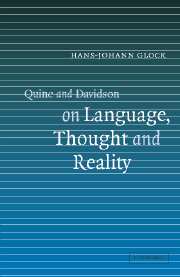Book contents
8 - Meaning and understanding
Published online by Cambridge University Press: 22 September 2009
Summary
Davidson's discussion of radical interpretation combines his own truth-conditional semantics with Quine's naturalist account of language. The idea already appears in ‘Truth and Meaning’, where it serves to illustrate how a theory of meaning can pass the requirement of empirical verifiability, that is, how it can be established whether a Tarskian truth-theory fits a given natural language. If we construct a truth-theory for a language other than our own, we cannot assume any insights into equivalences between object- and metalanguage and therefore operate under conditions of radical translation (ITI 27). In subsequent writings, radical interpretation comes to serve the additional function of defusing objections to truth-conditional semantics. There is also a gradual change from treating radical interpretation merely as a way of verifying claims about meaning to treating it as constitutive of meaning: only those features of a language accessible to a radical interpreter can be relevant to the meaning of its sentences. In the final instance, the thought experiment takes on a life of its own. It is supposed to yield interesting corollaries in epistemology, as well as a picture communication and understanding which is in some respects incompatible with the initial project.
The latter is the subject of this chapter. I start by arguing that radical interpretation cannot solve the extensionality problem and transform a theory of truth-conditions into a theory of sentence meaning (section 1).
Information
- Type
- Chapter
- Information
- Quine and Davidson on Language, Thought and Reality , pp. 233 - 267Publisher: Cambridge University PressPrint publication year: 2003
